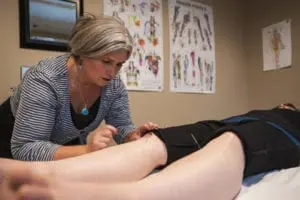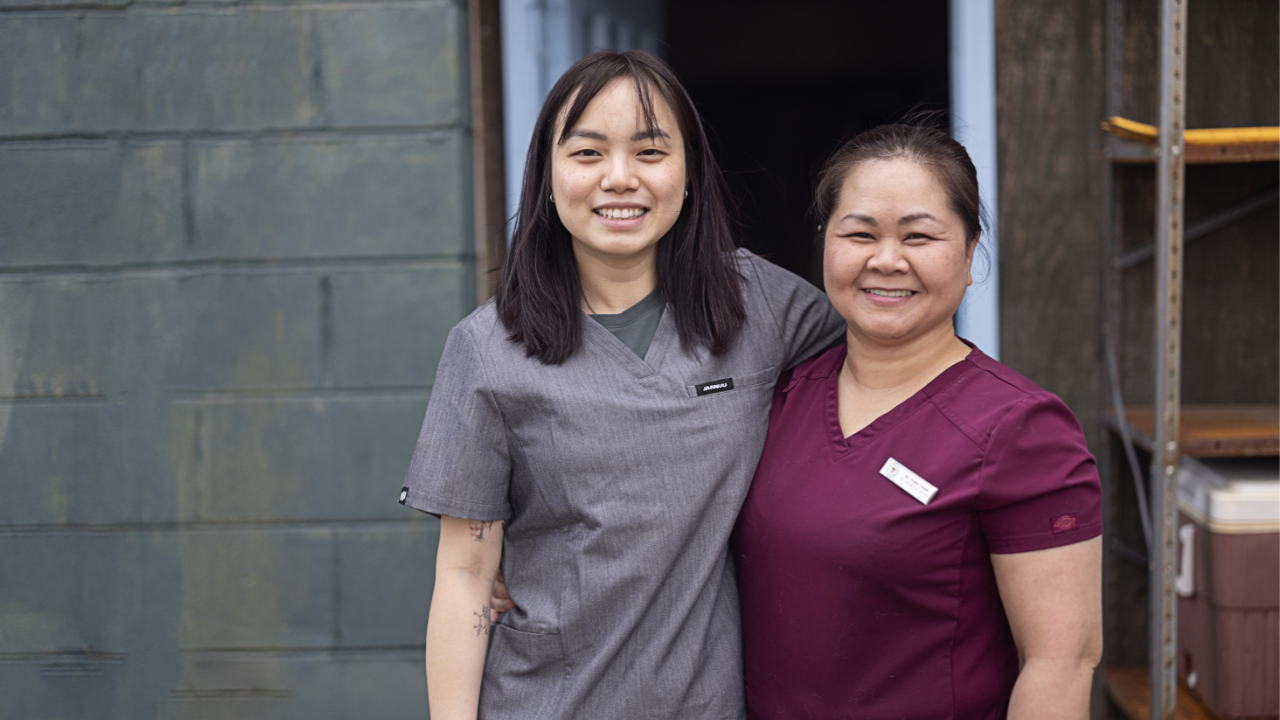Is an Acupuncture Career Right for You? 7 Must-Ask Questions
The acupuncture profession can provide a rewarding opportunity to join the healthcare field and help improve people’s health and well-being. In fact, there are more options today than ever for people considering acupuncture as a career.
Read on as we delve into what the profession involves and also highlight why acupuncture can be a great career choice. We’ll cover the following:
- The basic definition of an acupuncturist
- The job outlook and earning potential for an acupuncturist
- The advantages to acupuncture as a career path
- The qualities to have as an acupuncturist
- The steps it takes to become an acupuncturist
1. What is an acupuncturist?
An acupuncturist is a healthcare professional who treats illness and improves health by stimulating prescribed points on the body. This is done by using sterile needles or similar techniques that involve pressure, heat, or electric current.
The treatment redirects the flow of energy, or qi (pronounced “chee”), throughout the body to restore balance. Note that there is also a biochemical response in the body to the needles being inserted.
Acupuncture is an integral part of a larger medical system derived from traditional Chinese medicine. This is a comprehensive system of philosophy and treatment that addresses an individual’s total health—the physical body, the emotional body, and the mind.
Watch Northwestern Health Sciences University (NWHSU) faculty member John Pirog, MSOM, discuss acupuncture from both a layperson’s perspective and an acupuncturist’s perspective.
2. What is the job outlook for acupuncturists?
The job outlook for acupuncturists is encouraging, especially when you consider the expanding career options in healthcare.
The following details exemplify why acupuncture careers have a bright future:
Acupuncturists are playing a role in combating the opioid problem. With the ongoing opioid/painkiller crisis, the services of an acupuncturist are becoming an increasingly popular and effective alternative for pain management.
For example, Abbott Northwestern in Minneapolis became the first hospital in the U.S. to offer acupuncture in the emergency room as an alternative to pain medication.
Influential organizations are endorsing acupuncture. Important healthcare entities like The Joint Commission, the Food and Drug Administration, and the American College of Physicians all officially support acupuncture as a viable non-pharmacological option for pain relief.
Developments like these serve to further strengthen the future of acupuncture.
An increasing body of research supports the effectiveness of acupuncture. Here’s just a sampling of recent research supporting the efficacy of acupuncture.
Researchers at the University of York have found that acupuncture “reduces pain levels and improves mood levels.”
A large study published in The Journal of Pain demonstrated that “acupuncture treatment is a reasonable option for chronic pain patients.”
In another example, a Columbia University study concluded, “Acupuncture is an effective and well-tolerated strategy for managing” the side effects of aromatase inhibitors, a common treatment in early stage breast cancer.
Major healthcare providers have incorporated acupuncture treatment. Renowned institutions like the Mayo Clinic and Johns Hopkins Hospital provide acupuncture services.
The Veteran’s Health Administration recognizes acupuncture as a stand-alone profession and hires full-time licensed acupuncturists for its facilities throughout the country.
Memorial Sloan Kettering Cancer Center in New York City offers acupuncture treatment to cancer patients. Also, more than 60 percent of National Cancer Institute-designated comprehensive cancer centers include acupuncture to manage the symptoms of patients.
Acupuncture patients report high rates of satisfaction. What acupuncture patients say about treatment is obviously important. And on that front, there’s also promising data.
For example, in a large-scale study of 89,000 acupuncture patients, between 85% and 93% of those surveyed said that their acupuncturist successfully addressed their primary health issue.
3. What are some unique advantages to a career as an acupuncturist?
You can enjoy a number of unique career benefits as an acupuncturist. Consider the following examples.
It’s a rewarding healthcare career that’s also low-impact on the body. The daily routine of an acupuncturist can be much less physically taxing than other healthcare professions. In fact, this factor actually makes the profession an inviting second career choice for nurses and massage therapists.
Closely related, acupuncture is a profession people can feasibly practice well into retirement age.
You can specialize in areas that interest you. As an acupuncturist, you can choose to focus on serving specific kinds of patients. What are you passionate about? Who do you imagine working with on a daily basis? Here are some examples:
- Patients with fertility issues
- Expectant mothers
- Veterans
- Seniors
- Cancer patients
- Hospice patients
- Athletes
- Underserved patient communities
You may have the chance to explore options like these as an acupuncture student. For example, at NWHSU students have a variety of internship opportunities, both in our own clinics and other clinics in the community.
See acupuncture student Chris Johnson talk about the positive internship experiences he’s had through NWHSU.
You can enjoy a range of work setting options. You have more options than ever before to work as an acupuncturist in settings like these:
- Your own practice
- Chiropractic offices
- Massage therapy practices
- Integrative care clinics
- Veterans Affairs medical facilities
- Primary care clinics
- Hospitals
- Hospices
- Athletic facilities
4. Can you have your own practice as an acupuncturist?
Operating your own clinic is actually the most common way that acupuncturists practice. Although this path isn’t for everyone, many find it a rewarding option for reasons like the following.
You can have a more flexible schedule. When you have your own practice, you’re more able to design a schedule that fits with your lifestyle and personal preferences.
See former NWHSU student Stephanie Hylla discuss how she chose to become an acupuncturist and also why she enjoys running her own practice.
You can create your own atmosphere. What do you want your space to look and feel like, both for you and your patients? When it’s your practice, you have the power to create the kind of environment you want.
You have more control over your work pace and earnings. Acupuncture typically doesn’t require you to be hands-on with a patient the way that, for example, most massage therapists administer treatment. That means you can potentially see multiple patients within an hour and earn more in the process.
You can start a practice more easily thanks to lower initial costs. Start-up costs for a typical acupuncturist practice are significantly lower than other types of private healthcare practices. This can help create a much smoother path to opening your own establishment.
5. What is an acupuncturist’s salary or yearly income?
Larry Morgan of the Orion HR Group, a human resources consulting firm specializing in compensation analysis, reports the following average acupuncturist salary information for the Minneapolis-St. Paul metro area as of May 2020.
Note that these salaries are for W-2 employees and do not reflect the income of acupuncturists who own/operate their own business:
- Graduate to one year of experience: $48,800 annually, with data varying from $48,200 to $49,000
- 10+ years of experience: $59,000 annually, with data varying from $56,000 to $62,000
Many variables go into formulating reliable salary estimates. That’s why providing a single nationwide number is not the most accurate way to understand what an acupuncturist earns.
6. What qualities should you have to be an acupuncturist?
Is a career in acupuncture right for you? As you explore the possibility of becoming an acupuncturist, keep qualities like the following in mind. Do you see yourself in any of the following?
You want to help people. Is the idea of helping others important to you? As an acupuncturist, you have the chance to help your patients on multiple levels and connect with them more deeply.
For example, an acupuncturist can help people manage pain, in addition to helping with other conditions like insomnia and anxiety.
Also, acupuncturists utilize more than just needles. For instance, they can help patients achieve their health goals by making dietary recommendations and suggesting lifestyle changes.
Watch Angela Weber describe why she switched from a physician’s assistant path to attending acupuncture school at NWHSU.
You like the idea of providing hands-on treatment to people. An acupuncturist delivers hands-on treatment during patient visits. This makes it a much more patient-centered clinical encounter compared to, say, a medical doctor visit in which a patient is sent off with a prescription.
You want to play a role in the future of healthcare. Healthcare is changing in profound ways. For example, integrative healthcare bridges treatments like acupuncture with mainstream Western medicine. It’s also an approach that places more value on a patient’s preferences and experiences. If this sounds exciting to you, then an acupuncturist career could be a great fit.
You have an entrepreneurial spirit. Though not every acupuncturist wants or needs to have their own practice, many do. Some love the independence of being an owner/operator and are open to taking on additional responsibilities like billing, marketing, and office administration.
7. What are the official requirements for starting a career as an acupuncturist?
The following summarizes the basic requirements for becoming an acupuncturist. For more in-depth information, see How to Become an Acupuncturist.
Education. In the U.S., attending an accredited acupuncture or Chinese medicine program and obtaining a master’s degree is generally the minimum education requirement to become a practicing acupuncturist.
Prerequisites. For a master’s program, accredited acupuncture schools require 60 college or university level semester credits at a nationally or regionally accredited institution.
Length of time for schooling. The program length to become an acupuncturist will vary with the school and program you choose. At NWHSU, completing the Master of Acupuncture program takes 8 trimesters (or 2⅔ years).
Licensure or certification. In addition to completing formal education requirements, most states in the U.S. require you to pass specific certification exams to ultimately become a licensed acupuncturist.
So how do we know so much about acupuncture careers? Northwestern Health Sciences University has been preparing students for the rewarding profession of acupuncture for more than 20 years.
We are a mission-driven university, preparing the next generation of healthcare professionals to not only deliver but also advance healthcare.
For more information on an acupuncturist career, see How to Become an Acupuncturist.
LEARN MORE About Our Acupuncture and Chinese Medicine Programs









